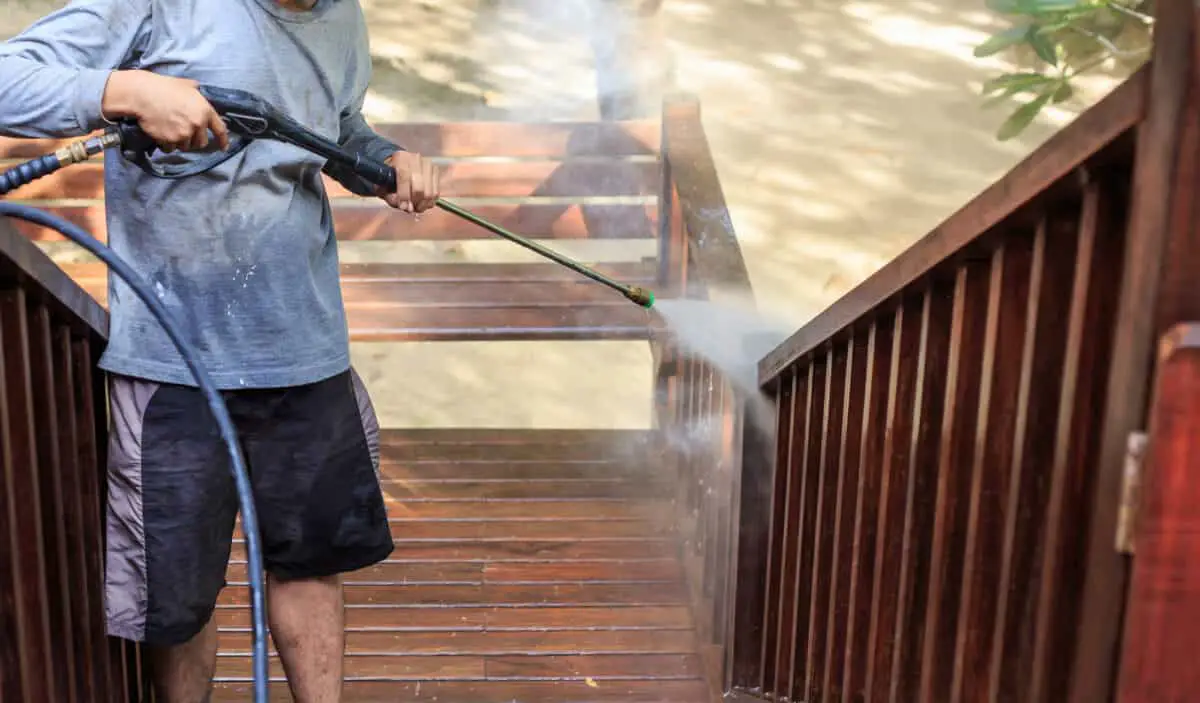A pressure washer has low pressure due to various factors, including an obstruction, poor hose connection, water supply, or kinks in the hose.
Debris can become lodged in the pressure washer nozzle, reducing its effectiveness.
The water supply may have low pressure due to the main spigot needing adjustment, or the main hose may have to be tightened or kinked.
The pressure washer hose may not be firmly secured to the wand.
A pressure washer can be an excellent solution for removing stubborn dirt and grime, but there may be times when the pressure is low.
Pressure washers can clean a variety of items, such as cars, mobile homes, garden equipment, BBQs, and more.
But what can you do if your pressure washer has low pressure, and why would this happen?
Let’s explore other potential causes for low pressure in your pressure washer and ways to ensure consistent pressure levels.
I wrote another article about choosing the best PSI for your pressure washer that may be helpful.

Related Reading: Do Pressure Washers Use Regular Gas?
Table of Contents
Troubleshooting Why Your Pressure Washer Has Low Pressure
As mentioned earlier, it’s essential to ensure that no debris is stuck in the nozzle of the pressure washer wand that may cause low pressure.
However, always remember never to point the end of the hose at your face while the pressure washer is turned on.
It is essential always to follow proper safety measures when using a pressure washer as they can be dangerous.
Before getting started, it may be best to check out this article I wrote about critical pressure washer safety tips.
First, check the wand connection.
Unscrew the wand and check inside the connection and inlet on the pressure washer, ensuring no obstructions.
When reconnecting, make sure the wand is attached correctly and firmly.
You should check the water inlet connection to ensure that the valve or hose is free of obstructions and that the rubber grommets are undamaged.
If you use a water butt (large container for collecting water), check for sediment at the bottom to prevent clogging at the inlet.
If you have checked all of the aforementioned possibilities and your pressure washer is still experiencing low pressure, it’s possible that the motor is faulty.
In such a scenario, it’s recommended that you refer to the user manual for troubleshooting or contact a specialist.
For more helpful information, Briggs and Stratton offers some FAQs about why a pressure washer has low pressure.
Pressure Washer Maintenance
Proper maintenance, service, and storage are important to ensure your pressure washer consistently runs at its desired pressure.
Simple preventive care can reduce times when your pressure washer has low pressure.
After using your pressure washer, clean it thoroughly, removing any dirt, debris, or oil.
During winter months, ensure to remove all hoses when storing your washer.
When water freezes, it expands, which can cause hoses to split, damage to perishable parts, or even irreparable damage to the internal workings of your pressure washer.
I made the mistake of not winterizing one year and had difficulty getting my pressure washer back to running the following year.
Lesson learned for sure!!!
If you encounter any issues with your pressure washer, always use the correct replacement parts.
For internal problems, consult the manufacturer for repair or replacement.
Checking Your Water Supply
One possible reason why your pressure washer has low pressure could be due to the garden hose that supplies the water.
The hose may not supply enough water to the machine, causing low water flow.
Ensure your hose is free of kinks or splits to avoid pressure loss.
It’s a good idea to detach the hose from the pressure washer and examine the water flow coming out of it.
If you notice the water supply is low, you should check along the hose for any debris or stones that might obstruct it.
This could help you identify and resolve the issue.
If you are experiencing low water pressure from your garden hose after checking all the other possible causes, the length of the hose is likely the culprit.
The longer the garden hose, the lower the water pressure at the end.
You might need to consider using a shorter hose instead.
If the problem persists, it suggests an issue with the main water supply.
Contact a professional to inspect your water pressure.
How to Adjust the Pressure on Your Pressure Washer
Some pressure washers have adjustable dials for water pressure.
A typical consumer-grade pressure washer provides 1400-2300 psi, which is sufficient for most home tasks, such as cleaning decks and driveways.
If you need more pressure, you’ll need to rent a pressure washer from a specialist or contact a professional pressure washing company.
You can increase the pressure of a pressure washer by rotating the spray wand clockwise or counter-clockwise.
Depending on how you turn the end, this creates a spray or stream.
Consult your product’s user manual for instructions on how to turn the handle in the correct direction to achieve your desired outcome.
These are two articles I wrote that may offer guidance when pressure washing.
- Best Pressure Washer Deck Cleaning Tips for Stellar Results
- What Size Pressure Washer To Clean Concrete
If a Pressure Washer Has Low Pressure, Will It Work?
If your home has low water pressure, your pressure washer can still operate at high pressure because it creates its water pressure.
Most pressure washers operate at approximately 2 gallons per minute (GPM).
Your pressure washer should work perfectly if your water supply can provide more than 2 GPM.
Most households have a water supply of 15 GSM, sufficient for pressure washing.
Final Thoughts
To ensure your pressure washer operates at its best for years to come, take the time to service and maintain it each time it’s used.
Check all hoses for blockages and splits, including garden hoses.
Ensure the main outlet tap is not faulty.
Rubber washers and grommets should always be checked to ensure they are not frayed or damaged, which can cause pressure loss.
If your pressure washer is still running on low pressure, it may be best to take it to a professional.
There is likely an internal problem with the machine.
Pressure washers are usually sturdy machines that can withstand much wear and tear.
However, if you take additional time to clean and service your pressure washer, you should be able to use it for a long time.
Enjoy living the outdoor life!!!
